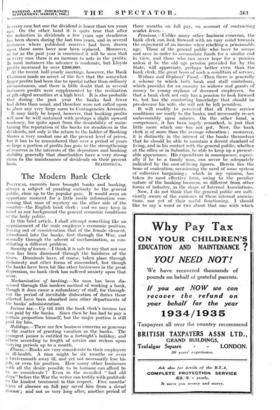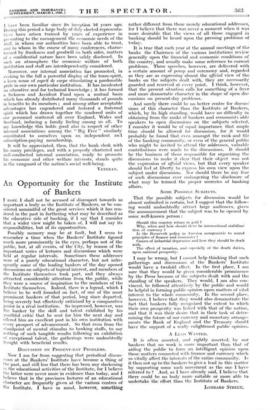The Modern Bank Clerk
POLITICAL currents have brought banks and banking, always a subject of puzzling curiosity to the general public, close up to the popular gaze. It would seem an opportune moment for a little inside information con- cerning that man of mystery on the other side of the counter—the English bank clerk ; and we may keep in mind as our background the general economic conditions of the body politic. In this brief article, I shall attempt something like an appraisement of the male employee's economic position, leaving out of consideration that of the female element, introduced into the banks, first. through the _War, and secondly through the advent of; mechanization, as con- stituting a different problem. Security of tenure.—I think it is safe to say that not one man has been dismissed through the hardness of the times. Dismissals have, of course, taken place through dishonesty and other forms of misconduct, but though the banks have been hit like other businesses in the great depression, no bank clerk has suffered anxiety upon that score.
Mechanization of banking.—No man has been dis- missed through this modern method of working a bank, though it does cause a redundancy of staff, for through- out the period of inevitable dislocation of duties those affected have been absorbed into other departments of the banks' administration.
Income tax.—Up till 1931 the bant clerk's income tax was paid by the banks. Since then he has had to pay certain proportion himself, but the major portion is still paid for him.
Holidays.—There are few business concerns so generous in the matter of granting vacation as the banks. The youngest junior is entitled to a fortnight's holiday, and others according to length of service can reckon upon varying periods up to a month. Illness.—Banks are very considerate to their employees in ill-health. A man might be six months or even a twelvemonth away ill, and yet not necessarily lose his job, or even his position. How many other businesses with all the desire possible to be humane can afford to be so considerate ? Even in the so-called " bad old days" before the War the writer can testify with gratitude to the kindest treatment in this respect. Five months' leave of absence on full pay saved him from a dread disease ; and not so very long after, another period- of three months on full pay, on account of contracting scarlet fever,— - - - • , Pensions.—Unlike many other business concerns, the bank clerk -ean lOok-fisrward with an easy mind towards. the enjoytherit Of an income when reaching a pensionable age: Those of the general -public who have to scrape and save in order to accumulate funds for a similar end in view, and those who can never hope for a pension unless it be the old age pension: provided for by the State, will appreciate, perhaps better even than the bank clerk, the great boon of stitch a contlitiOn of service Widows and Orphans' Fund.—Then there is .generally a scheme to which both bank and staff' contribute, which provides for an annuity to widows and grants of money to young orphans of deceased employees. So that a bank clerk not only has a pension to look forward to, but has the comforting knowledge that should he pre-decease his wife, she will not be left-penililess. It will readily be perceived that all these service conditions are costly to the banks, and necessarily re-act unfavourably upon salaries. On the- other hand, a competence, it has been sagely remarked, is just that little more• which..!one has not got. Now, the bank clerk is of more- than the average education ; moreover, it is distinctly in the interest of the banks themselves that he-should be able to maintain a decent standard of living, and in his contact with the general public, whether at the office or in Suburbia, be able to keep up a present- able appearance. His expenditure in- consequence, especi- ally if he be -a family man, can never be adequately indicated by the cost-of-living figures. Herein lies the bone of contention, occasioning the need of some systeni of collective bargaining ; which in'.my opinion, has taken its most effective form, owing to the peculiar' nature of. the banking business, so different_ front other forms of industry, in the shape of Internal Associations. Now, I do not think that the general public are suffi: ciently aware of the existence of these internal associa- tions, nor yet. of their useful functioning. I should like to say a word or two about that one with which I have been familiar since its inception 16 years ago. During this period a large body of duly elected representa- tives have arisen trained by years of experience in presenting to the management the economic needs of the staff, in whom our authorities- have _been able to trust, and to whom in the course of many conferences, charac- terized by frankness and goodwill on both sides, matters of a confidential nature have been safely disclosed. In such an atmosphere the economic welfare of both institution and staff are interdependently considered.
Moreover, our internal association has promoted, in evoking to the full a powerful display of the team-spirit, a keen sense of esprit de corps stimulating a pardonable pride in our own particular institution. It has inculcated an educative' zeal, for technical knowledge ; it has formed a Sickness and Accident Fund upon a mutual basis which has already distributed many thousands of pounds in benefits to its members ; and among other acceptable advantages has engendered and fostered a fraternal spirit which has drawn together the sundered units of our personnel _scattered all over England, Wales and Scotland, inducing a family feeling among us. all. To my knowledge this holds good also in' respect of other internal associations among the " Big Five " similarly constituted to ourselves upon an independent and subscription-paying membership.
It will be appreciated, then, that the bank clerk with his many_ privileges, and with a properly chartered and well-conducted internal association, ready to promote his economic and other welfare interests, stands quite in the vanguard of the nation's social well-being.
VETERAN.



























































 Previous page
Previous page